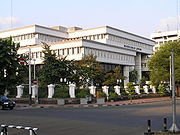
Indonesian Supreme Court
Encyclopedia
The Supreme Court of Indonesia is the independent judicial arm of the state. It maintains a system of courts and sits above the other courts and is the final court of appeal. It can also reexamine cases if new evidence emerges.
 The Supreme Court is independent as of the third amendment to the Constitution of Indonesia
The Supreme Court is independent as of the third amendment to the Constitution of Indonesia
. The Supreme Court has oversight over the high courts (Pengadilan Tinggi) of which there are about 20 throughout Indonesia and district courts (Pengadilan Negeri) of which there are around 250. The Supreme Court is the final court of appeal following appeals from the district courts to the high courts. The Supreme Court can also reexamine cases if sufficient new evidence is found. Constitutional matters, however, fall within the jurisdiction of the Constitutional Court of Indonesia
, established in 2003.
by the Judicial Commission
. If the House of Representatives approves them, their appointment is then confirmed by the president. The chief justice and his or her deputy is chosen from among the members. As of mid 2011, there was a total of 804 courts of various kinds in Indonesia. About 50 justices sat in the Supreme Court while other high and lower courts across Indonesia employed around 7,000 judges.
The funding for the Supreme Court allocated from the national government budget in 2010 was slightly over Rp 6.0 trillion (around $US 700 million at the prevailing foreign exchange rate).
The central problem appears to be that the institutions and mechanisms for enforcement of the legal system, including the decisions of the Supreme Court, are underfunded and are operationally weak. There are thus numerous instances of long delays in the enforcement of the decisions of the Supreme Court. As just one example, in a well publicised case, one of Indonesia's leading universities, the Bogor Agricultural Institute, was instructed by the Supreme Court to release certain details of controversial research conducted within the institute relating to the testing of formula milk brands on sale in Indonesia. However following the Supreme Court ruling, the institute failed to comply and even failed to pay a trivial fee (around $230) incurred as a result of certain proceedings during the conduct of the case. Numerous other cases of delays are regularly reported in the Indonesian media and are commented on by lawyers who have won cases in the Supreme Court.
Jurisdiction

Constitution of Indonesia
The Constitution of Indonesia is the basis for the government of the Indonesia.The constitution was written in June, July and August 1945, when Indonesia was emerging from Japanese control at the end of World War II...
. The Supreme Court has oversight over the high courts (Pengadilan Tinggi) of which there are about 20 throughout Indonesia and district courts (Pengadilan Negeri) of which there are around 250. The Supreme Court is the final court of appeal following appeals from the district courts to the high courts. The Supreme Court can also reexamine cases if sufficient new evidence is found. Constitutional matters, however, fall within the jurisdiction of the Constitutional Court of Indonesia
Constitutional Court of Indonesia
The Constitutional Court of Indonesia was established as a consequence of the third amendment to the Constitution of Indonesia, which was ratified by the People's Consultative Assembly on 9 November 2001 -History:...
, established in 2003.
Justices
According to the Constitution, candidates for Supreme Court Justices must have integrity and be of good character as well as be experienced in law. Candidates are proposed to the House of RepresentativesPeople's Representative Council
The People's Representative Council , sometimes referred to as the House of Representatives, is one of two elected national legislative assemblies in Indonesia....
by the Judicial Commission
Judicial Commission of Indonesia
The Judicial Commission of Indonesia was established as a consequence of the third amendment to the Constitution of Indonesia ratified by the Indonesian People's Consultative Assembly on 9 November 2001 -History:...
. If the House of Representatives approves them, their appointment is then confirmed by the president. The chief justice and his or her deputy is chosen from among the members. As of mid 2011, there was a total of 804 courts of various kinds in Indonesia. About 50 justices sat in the Supreme Court while other high and lower courts across Indonesia employed around 7,000 judges.
Conduct of court business
Like most of the Indonesian legal system, the Supreme Court is badly overloaded with demands on resources. One observer has noted that "the Supreme Court is drowning in an increasing flood of new cases each year". In 2010, for example, there were reportedly more than 22,000 cases before the court of which the court managed to rule on less than 14,000. Partly in response to pressures of this kind, proposals for reform of the way that court business is conducted have been under consideration for some time. Current proposals (2011) indicate that a new chamber structure will be introduced to try to improve the operations of the court. The plan is to introduce a system of five chambers which will deal with criminal, civil, religious, administrative, and military affairs. However, the changes are controversial so further reforms may be needed in due course.The funding for the Supreme Court allocated from the national government budget in 2010 was slightly over Rp 6.0 trillion (around $US 700 million at the prevailing foreign exchange rate).
Enforcement of rulings
One common criticism of the legal system in Indonesia is that law enforcement is weak. Even when the law is clear, and even when courts issue clear rulings, enforcement is often weak. In recent years, this criticism has often been made of the operations of the Supreme Court in Indonesia as well of the operations of other parts of the Indonesian legal system. The issue is, in principle, a serious matter for the Supreme Court because enforcement of the rulings of the Supreme Court sets standards for the enforcement of rulings across much of the rest of the Indonesian legal system.The central problem appears to be that the institutions and mechanisms for enforcement of the legal system, including the decisions of the Supreme Court, are underfunded and are operationally weak. There are thus numerous instances of long delays in the enforcement of the decisions of the Supreme Court. As just one example, in a well publicised case, one of Indonesia's leading universities, the Bogor Agricultural Institute, was instructed by the Supreme Court to release certain details of controversial research conducted within the institute relating to the testing of formula milk brands on sale in Indonesia. However following the Supreme Court ruling, the institute failed to comply and even failed to pay a trivial fee (around $230) incurred as a result of certain proceedings during the conduct of the case. Numerous other cases of delays are regularly reported in the Indonesian media and are commented on by lawyers who have won cases in the Supreme Court.

